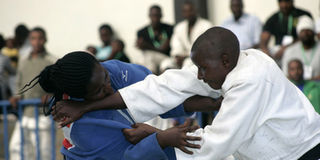Judo thrown off the mat as officials jostle for power

Kenya’s Cecilia Wangechi (left) fights with Odette Ntahomvukiye of Burundi in the Open Category of the 2014 Eastern Africa Judo Championship in Nairobi.
What you need to know:
- Akinyi’s impressive performance at the Games came hot on the heels of a stellar performance at the East and Central Africa Judo Championships in Zanzibar a month earlier where she won two gold medals and was named the tournament’s best athlete.
- KJA’s woes had been simmering for a while by the time the body was disbanded under IJF’s direction.
- According to Duncan Chemiryo, an official of the Coordination Board, the affiliation of Judo in Kenya has also played part in the development of the sport.
In April 2013, Kenya finally ended a continental medal drought in Judo when Esther Akinyi bagged a silver medal in the +78kg category at the 34th edition of Africa Judo Championships in Maputo, Mozambique.
Akinyi’s impressive performance at the Games came hot on the heels of a stellar performance at the East and Central Africa Judo Championships in Zanzibar a month earlier where she won two gold medals and was named the tournament’s best athlete.
The Zanzibar games, during which Kenya hauled 16 medals, coupled with the Maputo outing catapulted the country to 9th position in continental rankings released by the International Judo Federation (IJF) in April.
The medals won would however be overshadowed by a protracted power struggle and corruption allegations within the Kenya Judo Association (KJA) that ultimately led to the dissolution of the organisation.
GENESIS OF PROBLEM
KJA’s woes had been simmering for a while by the time the body was disbanded under IJF’s direction. The genesis of the KJA’s problem can be traced to November 2012 when Chairman Stephen Soi, armed with a court order, halted association’s AGM.
A temporary injunction had been issued restraining vice-chairman Mwangi Mbutu and secretary-general Shadrack Maluki from holding the AGM.
Throughout 2013, KJA would be entangled in turf wars pitting Soi and Mwangi, both of whom claimed chairmanship of the body.
More trouble would befall the association when Maluki and treasurer David Busolo were suspended on allegations of embezzlement of Sh5.7 million from KJA’s coffers.
It wasn’t until December when a delegation led by Dhouib Hedi, the International Judo Federation International Affairs director, that some semblence of sanity was restored.
The two antagonists agreed to work under an interim body, the National Judo Coordination Board which was ratified by the IJF to run the affairs of Judo in Kenya up to March 31st 2014.
The arbitration committee called for among other things, the drawing up of a proper constitution in line with IJF precepts and the Sports Act; the withdrawal of the court case as well as holding fresh elections. Soi assumed the chairmanship of the oversight body.
The court case, which was set to receive ruling in June is still pending. While the Coordination Board is the sole recognized body by IJF, the running of Judo in the country is in a polygamous state, with both the Coordination Board and a faction led by Maluki, who is now the secretary general of the East Africa Judo Union claiming to run the affairs of the sport in the country.
This was apparent during the East Africa Judo championships held in Nairobi in April. According to the Coordinating Board, the games were not sanctioned by the IJF but were conducted under the Maluki faction.
Judo in Kenya will celebrate its jubilee this year. But is the sport off the mat yet? “The sport is not where it should be,” says Jenniffer Jean Louis, one of Kenya’s premier judokas and referee.
“Some few years ago, one had to earn his or her Black Belt; that is no longer the case. The sport has become different.”
According to Duncan Chemiryo, an official of the Coordination Board, the affiliation of Judo in Kenya has also played part in the development of the sport.
“Judo is mainly entrenched in the discipline forces as opposed to it being a civilian sport. But if we introduced it to young people, say, at 8 years, by 14, they would be champions,” he says.
Chemiryo adds that judo could be popularised in the same way as wrestling, which is practised by a number of communities in Kenya.
“Introducing Judo wouldn’t be hard as it would be a matter of refining an art that these people already know.”
The Kenya Judo team at the July Commonwealth Games in Glasgow, Scotland returned home empty-handed.




